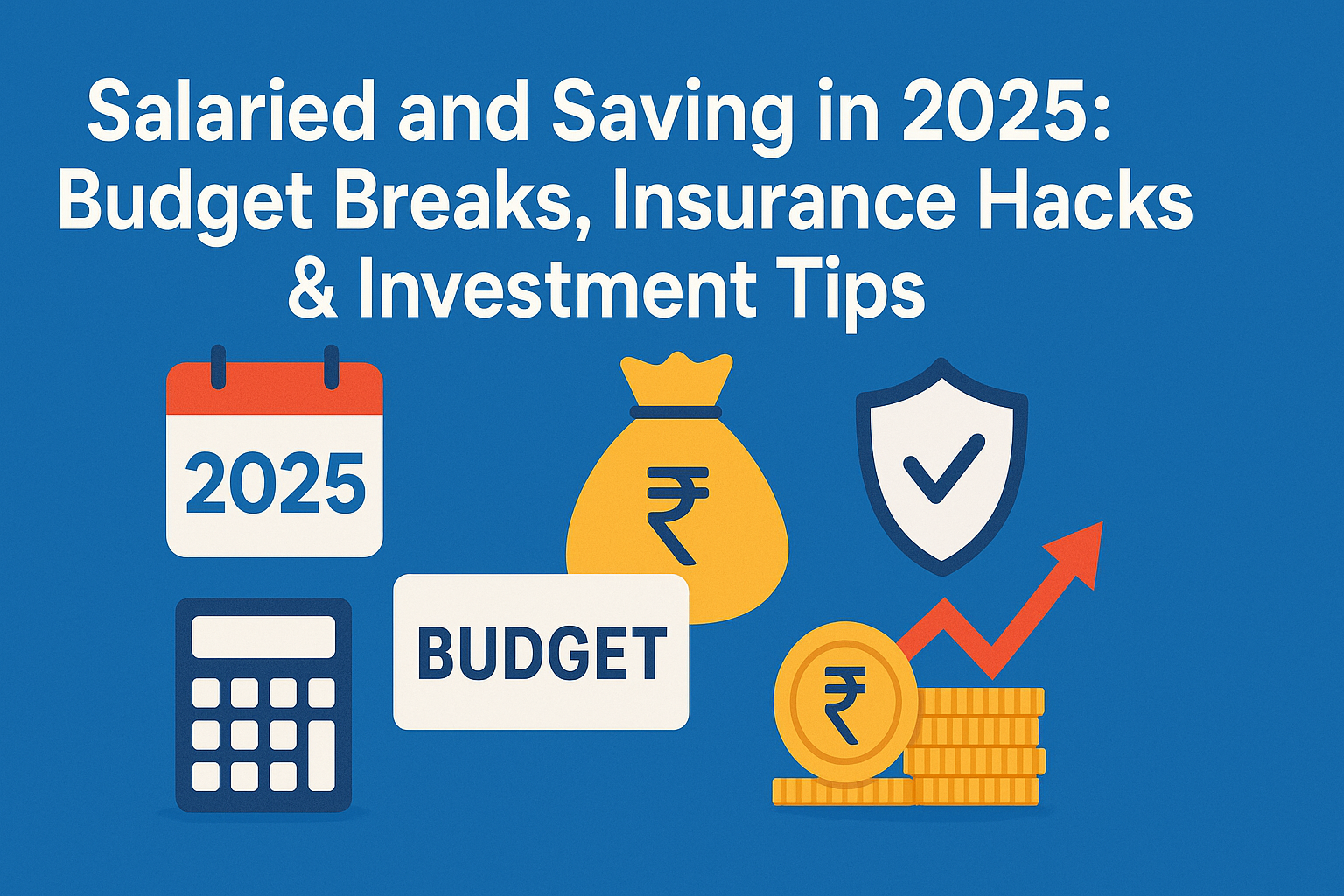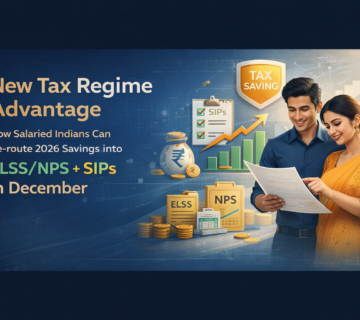In 2025, salaried workers in India are going through a big change in their personal finances. This year has changed how working people can plan their money. The Union Budget gave them a lot of tax breaks, there are new insurance rules, and there are good investment options. This is the best time to look at your spending habits again, no matter where you live, even if it’s in Gurgaon.
Instead of blindly following old rules, 2025 lets you change your budget, choose better insurance, and spread your investments. This guide breaks down the most recent changes in simple terms and gives you clear steps to make the most of them. You will also see how a financial goal planner, financial goal calculator, or the best financial planner in Gurgaon can help you go even further.
Smart Money Moves for Salaried Employees in 2025
Let’s walk through the three biggest areas that impact every salaried employee today—budget and tax relief, insurance security, and investment choices.
Budget 2025: Bigger Tax Relief for the Middle Class
The Union Budget brought the biggest change in years. Under the new income tax regime, no tax is payable on income up to ₹12 lakh. Earlier, this limit was ₹7 lakh.
This change means:
- If your salary is up to ₹12 lakh, you pay zero tax under the new regime.
- For those earning more, the lower slabs still reduce overall tax outgo.
- This puts more money back in your hands every month.
Experts have said that this reform is aimed at “filling the pockets of citizens and boosting savings” (Indian Express, 2025).
But should you switch to the new regime?
- If you don’t use many deductions like PPF, home loan, or insurance, the new regime is better.
- If you depend heavily on deductions under Section 80C, 80D, or 24(b), the old regime may still save you more.
Tip: Use the extra savings wisely. Add to your SIPs, open an NPS account or create an emergency fund rather than allowing the additional money to disappear in lifestyle spending.
Insurance: Flexibility and Protection After New Rules
After you’ve figured out your budget and tax options, the next thing you need to do is get the right insurance for you and your family.
In October 2024, IRDAI simplified the understanding of insurance policies for customers. Life insurance companies now have to give you more money if you cancel your policy after just one year.
Assuming you are getting paid a salary, this would imply that you will be able to get back more funds in case you do not want to retain your old endowment or money-back plans. The flexibility allows you to take up better products, such as term insurance.
- Term Insurance: Term insurance is the simplest and most affordable way to protect your family. Choose a cover that is at least 15–20 times your yearly salary. Don’t depend only on the insurance your company gives, as it may not always be enough.
- Health Insurance: Medical costs are rising fast, so health insurance is a must. For a family, take a plan of at least ₹10–15 lakh. If you live in Gurgaon, check plans from the best health insurance company in Gurgaon to get a wide hospital network and quick claim service.
- Critical Riders: Get stronger by adding riders. These additional accident or serious illness covers provide you with additional security at a minimal additional fee.
The changes have resulted in insurance no longer being a fixed cost. It has become an adaptable layer that can be transformed with the changes in the lives of salaried workers.
Investments: Where to Put Your Salary Savings in 2025
When you have optimized your budget and secured yourself, the next best thing to do is to invest your money in a smart way.
Interest rates and tax rules have shifted in the last two years, changing the way you should invest.
- Fixed Deposits vs Debt Funds: FDs will yield 78 per cent per year in 2025. As a short-term savings method, FDs are a good and safe option, as debt funds no longer benefit tax-wise in 2023.
- Equity Mutual Funds: SIPs are considered to be the most effective tool to grow money in the long run. Even 5000 per month is going to be lakhs in 15-20 years. Good for a retirement or a child’s school fund.
- NPS and ELSS: ELSS assists in saving tax and provides equity growth under the previous tax system. NPS is also retirement worthy since it is both safe and grows.
- Diversification: Do not invest everywhere. Combine equity, FDs and some gold or REITs. This will protect your money in case one of the markets collapses.
Some professionals are also exploring the FIRE movement (Financial Independence, Retire Early). By saving 40–50% of income, keeping lifestyle costs low, and investing aggressively, it is possible to achieve financial independence by the 40s.
Gurgaon as a Financial Planning Hub
Finally, when you need expert help, Gurgaon is one of India’s top financial hubs. With its corporate offices and young workforce, many salaried people here look for the best financial service or planner in Gurgaon. A planner is more than an advisor—they act as a coach, guiding you step by step toward your money goals.
Here’s what a good financial planner can do for you:
- Compare the new and old tax regimes: Tax rules are tricky. A planner can look at your salary, deductions, and expenses to tell you which option saves you more money.
- Use a financial goal calculator: Everyone has dreams—buying a house, saving for children’s education, or building a retirement fund. A financial goal calculator shows how much you need to save each month to make those dreams a reality.
- Create a personalized plan: You receive an understandable roadmap of how to save, invest and safeguard your money to suit your lifestyle rather than random tips.
- Guide on insurance: From term insurance to health insurance, a planner makes sure you have the right cover so your family is always safe.
You can now get expert financial advice online from anywhere in India. With the right planner, you’ll learn how to grow, protect, and use your money to reach real goals.
Building a Personal Financial Roadmap
Here’s an easy action plan for salaried workers in 2025. These steps will help you use the new rules wisely, protect your family, and build a strong financial future.
- Look into your taxes: Don’t pick a tax system without checking. Compare the old and new systems and see which one gives you more savings. The new system works better if you don’t use many deductions. The old one may still suit you if you have a home loan, PPF, or big insurance payments.
- Rework your budget: Determine how to spend the additional amount of money that you will save in tax savings. Invest it in SIPs, NPS or superior insurance rather than using it to shop or at restaurants. Any rupee that you save today will assist you tomorrow.
- Get insured: Money and fame are the same, but money and fame are different. Take term insurance for your family and health insurance to cover hospital bills. Add extras such as accident or illness cover to increase the safety.
- Investment diversification: Do not have all the money under the same roof. Keep a bit in equity funds to grow, a bit in FDs to be safe and a bit in gold or other safe investments to provide some balance. In this manner, your plan is safe even when one of the markets goes down.
- Goals set: We all have targets such as buying a house, taking children abroad or early retirement. Use a financial goal planner or calculator to indicate how much to save and over what period of time. It keeps you on track.
- Avoid lifestyle inflation: A higher salary doesn’t mean higher spending. Don’t rush to upgrade cars, phones, or houses every year. Use that money to build wealth instead. Small sacrifices today bring big rewards later.
These simple steps can turn a paycheck into real financial freedom.
Conclusion
By 2025, the full benefit of tax breaks, smarter insurance regulations and solid investment decisions can be enjoyed by the salaried workers. With planning, you are able to build savings, secure your family and achieve the big things in life, such as retirement or acquisition of a house. Do not allow additional funds to become part of lifestyle expenses, but rather invest the funds to create wealth. For professional support, reach out to the best financial planner in Gurgaon through The Wealth Escalator by JRG Financial and start building a secure and successful financial future today.
FAQs
How much income is tax-free in 2025?
Under the new tax system, if your income is up to ₹12 lakh in a year, you don’t have to pay any tax.
Should salaried employees buy personal insurance if the company provides it?
Yes. The cover your company gives may not be enough. It’s better to have your own term insurance and health insurance for full safety.
Where should I invest my salary in 2025?
Put your money in a mix: SIPs in equity funds for growth, fixed deposits for short-term needs, and NPS for retirement savings.
How do I use a financial goal calculator?
Type in your goal (like retirement, child’s education, or a trip), the years you have, and how much you can put in each month. The calculator will tell you how much you should save and invest.
Why hire a financial planner in Gurgaon or India?
A planner guides you for the long run, helps you stay disciplined, and makes sure your money plan matches your life goals.



